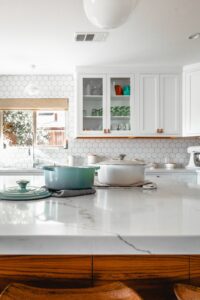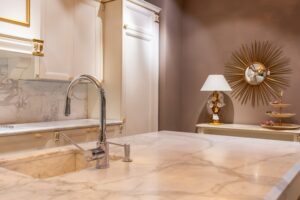
When choosing a countertop material for your kitchen, you want to make sure you pick the perfect one for you and your lifestyle. For example, if you make many home cooked meals, you want to make sure that your counters can stand up to the wear and tear that comes along with it – including hot pots and pans.
Marble is a beautiful, classic material that will add an elegant touch to any interior design. It is renowned for its beauty–with its unique natural patterning and texture–but the worry of accidentally damaging your investment with a nearby hot pan or appliance can make buyers hesitant. In this blog post, we’ll answer all your questions about how marble performs in high-heat situations and highlight tips on keeping it looking as beautiful as ever.
 Heat Resistant vs. Heat Proof
Heat Resistant vs. Heat Proof
Knowing the difference between heat resistant and heat proof is important, especially with things that often come in contact with hot objects. Kitchen countertops are one of these things. Heat resistance usually refers to materials that are able to endure brief contact with high temperatures without changing shape or melting; however, it does not guarantee that the material will remain untouched if exposed longer to higher temperatures.
On the other hand, heat proof implies total protection against temperatures thanks to its material quality and construction, plus an additional safety margin if exposed to a higher temperature than allowed. They are designed to endure high temperatures without taking any damage.
Knowing the difference between heat resistance and heat proof can save your kitchen countertops from future damage.
Can Marble Countertops Handle Heat
When it comes to countertops, marble is a classic option that many homeowners prefer. Not only can it create a timeless and luxurious atmosphere, but it also provides certain heat-resistant qualities compared to other countertop materials. Since marble is a natural stone, it is heat resistant up to 350 degrees Fahrenheit. While extended contact with high temperatures can still cause some damage, a well maintained countertop should not be affected by an occasional hot item or short-term exposure to high temperatures.
Marble countertops may still require some extra care and attention when it comes to ensuring their longevity and protection from high temperatures, so taking the necessary steps to limit direct contact with source of heat is recommended for all homeowners who choose marble countertops for their space. Marble countertops should have a sealant applied periodically in order to make them heat resistant. This helps prevent staining or scorching from hot cookware or appliances such as crock-pots, coffee makers and skillets. With just a little bit of extra care on a regular basis, your countertop should be able to handle even high levels of heat without any damage.
Are Marble Countertops More Heat Resistant than Other Countertop Materials?
 When it comes to heat resistant countertops in your kitchen, marble is definitely a good option. Marble is known to be resistant to discoloration or burns which is an important factor that homeowners need when installing countertops in their kitchens. In comparison, countertop materials such as terrazzo and recycled glass are more susceptible to heat damage. Although all counter surfaces can be affected by high levels of heat, marble countertops can withstand temperatures greater than those produced in a typical kitchen.
When it comes to heat resistant countertops in your kitchen, marble is definitely a good option. Marble is known to be resistant to discoloration or burns which is an important factor that homeowners need when installing countertops in their kitchens. In comparison, countertop materials such as terrazzo and recycled glass are more susceptible to heat damage. Although all counter surfaces can be affected by high levels of heat, marble countertops can withstand temperatures greater than those produced in a typical kitchen.
There are several other options that are as heat resistant as marble countertops, though. For example, granite and quartz counters – both natural stones – are even with marble when it comes to heat resistance. The benefit of marble, however, is that it will not suffer surface damage or discoloration.
When choosing the countertop material for your kitchen, make sure you choose one that works best for you. If you are not sure what the best countertop choice is for you, contact Kitchen Express in Greensboro, North Carolina. Our expert team is happy to help!
 How to Protect Marble Countertops From Heat
How to Protect Marble Countertops From Heat
Protecting your beautiful marble countertops from heat requires a bit of effort on your part. To do this, you should always use hot pads or trivets when available to protect the counter when placing hot cookware and countertop appliances on it. Investing in some coasters is also a great option to keep heat sources from directly touching the marble. Additionally, if any heat sources such as slow cookers are being used near the countertop it is strongly recommended that they are placed on a heat-resistant surface like an area rug or tile floor.
Additionally, you should never treat the counter with any kind of cleansers that contain vinegar or other acidic ingredients as these can etch the counter’s surface. When the acid wears down the counter, it will make it less heat resistant. Also, applying stone sealer periodically can provide an extra layer of protection against potential damage caused by heat.
With some extra care and attention, it is possible to retain your counter’s showroom-new shine while still enjoying its durability and timeless beauty.
We Can Bring Your Dream Kitchen to Life
The countertop material you choose for your kitchen can make a big difference in its overall look and feel – but it’s also important to think about functionality. Are marble countertops more heat resistant than other materials? In short, the answer is yes – marble is an exceptionally heat-resistant natural stone. However, that doesn’t mean that it’s completely impervious to damage from high temperatures.
Of course, if you have any further questions about whether marble is the right choice for your kitchen countertops, don’t hesitate to contact Kitchen Express today. We would be happy to help you bring your dream kitchen to life!
Contact Kitchen Express Today
